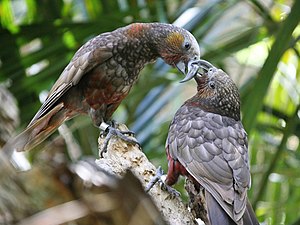Strigopoidea
| New Zealand parrot Temporal range: Early Miocene to present |
|
|---|---|
 |
|
|
New Zealand kaka, North Island subspecies (Nestor meridionalis septentrionalis) at Auckland Zoo, New Zealand |
|
| Scientific classification | |
| Kingdom: | Animalia |
| Phylum: | Chordata |
| Class: | Aves |
| Order: | Psittaciformes |
| Superfamily: |
Strigopoidea Bonaparte, 1849 |
| Family: |
Strigopidae Bonaparte, 1849 |
The New Zealand parrot superfamily (Strigopoidea) consists of three genera of parrots, Nestor, Strigops, and the fossil Nelepsittacus. The genus Nestor consists of the kea, kaka, Norfolk Island kaka and Chatham Island kaka, while the genus Strigops contains the iconic kākāpō. All extant species are endemic to New Zealand. The species of the genus Nelepsittacus were endemics of the main islands, while the two extinct species of the genus Nestor were found at the nearby oceanic islands such as Chatham Island of New Zealand, and Norfolk Island and adjacent Phillip Island. The modern common species names, kea, kākā, and kākāpō, are the same as the original Māori names.
The Norfolk kaka and the Chatham kaka have become extinct in recent times, while the extinct species of the genus Nelepsittacus have been extinct for 16 million years. All extant species, the kākāpō, kea, and the two subspecies of the kākā, are threatened. Human activity caused the two extinctions and the decline of the other three species. Settlers introduced invasive species, such as pigs and possums, which eat the eggs of ground-nesting birds, and additional declines have been caused by hunting for food, killing as agricultural pests, habitat loss, and introduced wasps.
...
Wikipedia
